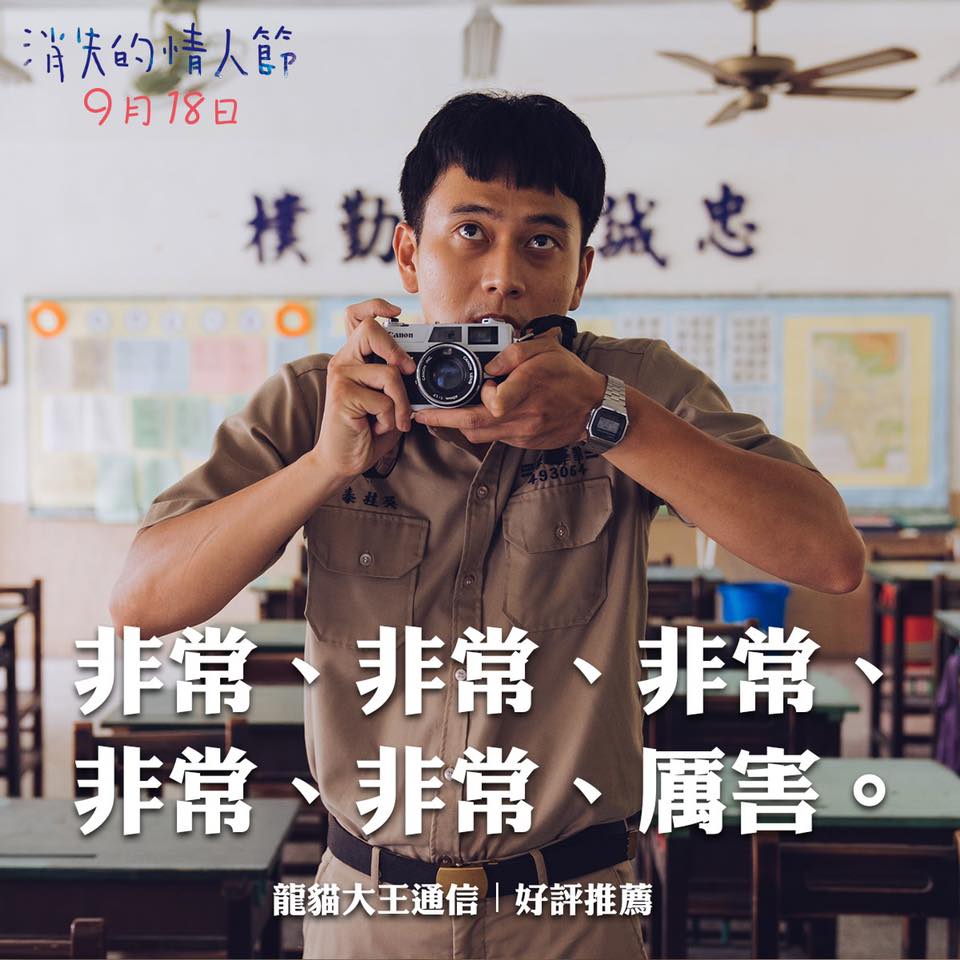by Brian Hioe
語言:
English
Photo Credit: My Missing Valentine/Facebook
This is a No Man is an Island film review written in collaboration with Cinema Escapist. Keep an eye out for more!
MY MISSING VALENTINE (消失的情人節) surprised in 2020 when it swept the Golden Horse Awards, Taiwan’s top film awards. The movie took home not only Best Feature Film, but also Best Original Screenplay and Best Director. The film’s two leads, Liu Kuan Ting and Patty Lee, were nominated for Best Actor and Best Actress, respectively, but did not win.
Yet My Missing Valentine has generally not had much critical attention—particularly in English. It seems that, like many otherwise highly competent Taiwanese films, the movie suffered from a poor advertising campaign, including poorly cut trailers that are not reflective of the film.
A romantic comedy, My Missing Valentine is much more the sum of its parts. Perpetually single, Yang Hsiao-chi, a 30-year-old clerk at a post office, is someone who has always been half a beat ahead of the world. From childhood, Yang seemed out of synch with the world, always reacting slightly faster to what happens around her.

A-Tai. Photo credit: My Missing Valentine/Facebook
Yang’s dismal romantic life seems to take a sudden turn for the better when she meets Liu Wen-sen, a dance teacher who also works in blockchain, shortly before Valentine’s Day. This sets into motion the events of the film.
By contrast, A-Tai, a 30-year-old bus driver is half a beat behind the world. A slow talker with poor reflexes, A Tai has always been a social outsider because of his inability to keep pace with a world in constant motion. Though she does not remember him, Yang Hsiao-chi is A-Tai’s childhood crush, the two having originally met after a car accident that put the two of them in the hospital. Desperately pining for Yang, A-Tai sends a letter from the post office that she works at daily, but Yang thinks of A-Tai as simply the weirdo that comes in to mail a single letter every day.
The film is divided into two halves, the first of which tells the story from Yang’s point of view, and the second of which examines the same events from A-Tai’s perspective. The story takes a sudden turn for the supernatural when Yang wakes up a day later after Valentine’s Day, with no memory of what happened that day—seemingly having missed her date with Liu Wen-sen. A-Tai, however, experiences Valentine’s Day as a day in which time freezes.
There is nothing remarkable about My Missing Valentine’s plot. Films about long-lost childhood loves seem to be a dime a dozen these days in contemporary Taiwanese cinema, as also memorably seen in Classmate Minus, another 2020 film. Similarly, My Missing Valentine could easily be a gimmicky film, with its plot device of time freezing or its diametrically opposed protagonists.
My Missing Valentine excels in spite of this—or perhaps precisely because of this, as a genre piece. This is due to the film’s many intricate set pieces, highly dynamic script, and talented acting. Where My Missing Valentine draws viewers in, it is because of the many entertaining diversions that take place as the story unwinds. Highlights include the set transformation that takes place when Hsiao-chi calls up her favorite radio show to complain or brag about her love life, or when she finds a gecko, framed in Haruki Murakami-esque manner as a keeper of lost things and depicted as a traditional Taiwanese locksmith.

Yang Hsiao-chi (left) and her mother (right). Photo credit: My Missing Valentine/Facebook
The film’s recurring tropes, such as Hsiao-chi and A-Tai always blinking during photographs due to being half a beat ahead or behind time, are clever. The script is well-written to the point that even simple conversations between Hsiao-chi and her mother can be entertaining and highly memorable. Other moments include Liu Wen-sen’s fitness routine, scored by Taiwanese singer-songwriter Ma Nien-shien.
The film’s two leads are remarkably acted, with Patty Lee’s Yang Hsiao-chi carrying the first half of the film through magnetic charisma. While the second half of the film, focused on A-Tai, does not maintain the energy of the first half of the film, Liu Kuan-ting’s performance manages an exceptional transformation from his usual roles, becoming almost unrecognizable as A-Tai.
My Missing Valentine probably stands out as among the strongest romantic comedies to be produced in Taiwan in past years. This is a genre that Taiwan sees much of and which, unfortunately, are usually far from as original as My Missing Valentine.



